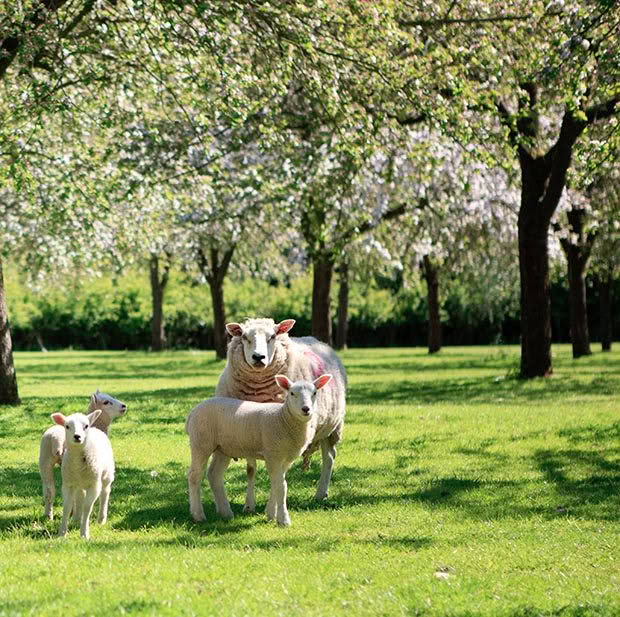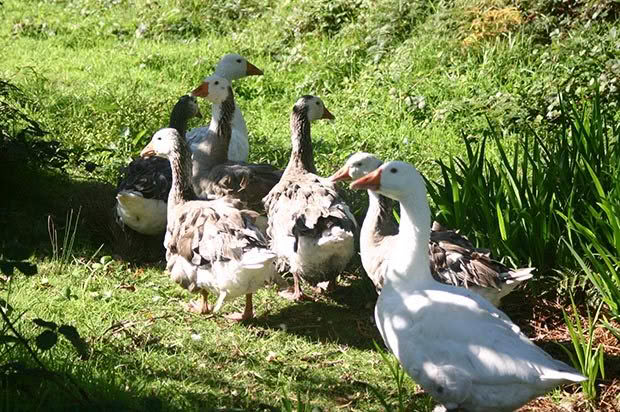Animals that are helpful for fruit trees (and animals that will hinder them)

Some animals in an orchard are your friends and some are a definite no-no.
Words: Ben Gaia
Animals are a constant source of challenges if you live in the wop wops, and they can have unexpected consequences on your fruit production. Having a dog can mean more fruit through fewer possums. Having a hunting cat could mean fewer feijoas, which are bird-pollinated. Hosting a beehive can increase your blossom pollination rate.
FENCING
Interaction with stock animals is an important factor but you need to keep a close eye on them. My advice is always to keep them at least two well-made fences away. Fences must be strong and high enough to keep out nearby cattle and preferably even leaping deer if you are next to a forest.
Fence out all big grazing animals from a new orchard until trees have a clear trunk of 2m. Only very big old apple or pear trees can be under-grazed by horses and alpacas.
BAD ANIMALS IN A YOUNG ORCHARD
Sheep and goats can be a nightmare for the new orchard grower. Mean-spirited cattle and horses will vindictively pull out your newly-planted efforts in a single night if the gate is left open.
BAD ANIMALS AT ANY TIME
Goats will climb trees, strip them down and kill them so don’t have goats in your orchard unless they’re part of the mulch.
Cows are too destructive for orchards and will make you weep in despair.
GOOD ANIMALS
Even when your trees are huge, only a few part-time grazers should be let in, definitely not a hungry herd who will chew the bark, pug the ground, and rub on orchard trees, killing big old trees except, perhaps, ancient plums.
Well-behaved horses and sheep will happily graze the orchard in winter when all the fruit is picked and the leaves have fallen. Only a good horse should be trusted in your orchard, one that respects fences and hotwires and doesn’t chew on twigs. Generally horses will leave fruit trees alone if they look like sticks, and there is long fresh standing hay in there.
When the grazers look hungry, get the horse or sheep back out and put them two fences away again for the rest of the year. The benefits of their manure are considerable, building soil humus and retaining nutrients and moisture in the improved soil.

Grazing birds like geese can be very helpful for weed control, manure spreading, and as security alarms. Chooks, geese and ducks are handy, mowing and manuring the orchard and cleaning up fallen fruit. They control the breeding cycles of pest insects, cut the grass for just a few bucks of food a week, and deliver high nitrogen fertiliser to each fruit tree, crapping with virtually every step they take.
Pigs can be useful against persistent root weeds like cocrosma bulbs, but should be removed before digging around the tree roots too much. They are good for preparing ground and supplying manure. Pigs will clean up rotting windfall fruit.
Four wekas are in charge of my tree nursery and care for it well if I am out. Their mission as my unpaid wwoofers is to go around the tree pots and eat the snails to prevent the serious damage they can cause. Being organic I won’t use snail pellets, especially after having to euthanase a neighbour’s puppy which was convulsing helplessly from eating them. The wekas do a great job on the snails – they just don’t clear up afterwards, so the cranberry pots are strewn over a wide area, lying on their sides. But on aggregate they do more good than harm with not a snail or grass grub in sight. And no chemicals either.
YES AND NO ANIMALS
What animals go well with orchards?
Bees, poultry and waterfowl – basically all small things with hardly any teeth.Bees, chickens, ducks, geese, dogs, wekas: yes.
Sheep and horses:
in winter only.
Alpacas: ok in the short term in an orchard with full standard trees, ie pruned trunks up to 2m.
Pigs: ok, short term.
Goats and cattle: Never.
KEEP PUT THE BAD BIRDS
Net vulnerable fruit, especially berries, against blackbirds. Other songbirds tend to be useful in other ways as pest controllers.
About the author
Ben Gaia grows trees in the extreme climate of the West Coast of the South Island and runs a mail order nursery for organic fruit and forestry trees, www.dialatree.co.nz
Love this story? Subscribe now!
 This article first appeared in NZ Lifestyle Block Magazine.
This article first appeared in NZ Lifestyle Block Magazine.
